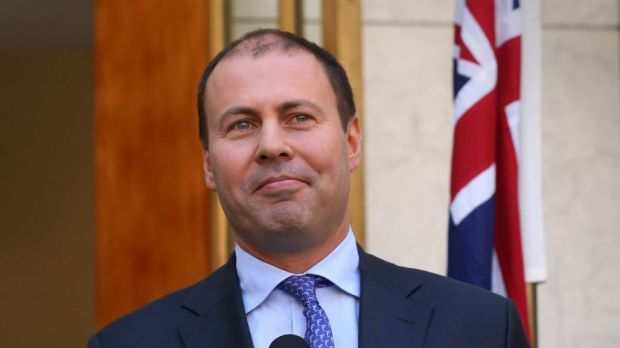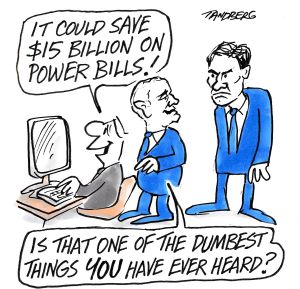The Turnbull government has been sitting on advice that an emissions intensity scheme - the carbon policy it put on the table only to rule out just 36 hours later - would save households and businesses up to $15 billion in electricity bills over a decade.
While Malcolm Turnbull has rejected this sort of scheme by claiming it would push up prices, analysis in an Australian Electricity Market Commission report handed to the government months ago finds it would actually cost consumers far less than other approaches, including doing nothing.
More National News Videos
States consider carbon trading
South Australia suggests the states set up their own carbon intensity trading system, but Mike Baird is not so keen. Courtesy ABC News 24.
It finds that would still be the case even if the government boosted its climate target to a 50 per cent cut in emissions by 2030.
Depending on the level of electricity use and the target adopted, modelling by Danny Price of Frontier Economics found costs would be between $3.4 billion and $15 billion lower over the decade to 2030. Costs would be $11.2 billion lower over this time assuming average electricity use and the existing climate target.
It suggests it would bring down the cost of cleaner gas-fired electricity and renewable energy, more than offsetting an increase in the cost of high-emissions coal power.
Environment and Energy Minister Josh Frydenberg flagged this sort of scheme for the electricity industry would be considered as part of a long-promised climate review, but was forced to backtrack after opposition from conservative government MPs opposed to any form of carbon pricing.
The modelling is part of a group reports on the future of energy to be discussed by the Prime Minister and state premiers ahead at a COAG meeting in Canberra on Friday.
They include a preliminary report into the future security of the electricity market by chief scientist Alan Finkel, which warns that Australia has no clear path to meeting the 2030 emissions target taken to the Paris climate deal under existing policies.

While it makes no recommendations, the Finkel review cites the market commission, Australian Energy Market Operator and Climate Change Authority as all having found an emissions intensity scheme would have lower costs and less impact on energy security than other policies considered.
It comes in a week in which Mr Turnbull launched an aggressive attack on Labor over its support for emissions intensity trading as well as a 50 per cent renewable energy target.

Interviewed on Melbourne radio station 3AW on Thursday, Mr Turnbull contrasted Labor's position with the Coalition's determination to keep prices down. He stressed that the government would not impose a carbon tax or an emissions trading scheme.
"I just want to be very, very clear that energy prices are too high already. We will do everything that we can to put downward pressure on energy prices," he said.

Under all scenarios considered, the modelling in the commission report seen by Fairfax Media found an emissions intensity scheme was the cheapest option for consumers and business.
That remained the case if the emissions target was beefed up from a 28 per cent to a 50 per cent cut by 2030 compared with 2005 levels. Under the latter consumers and businesses would still pay $3.4 billion less than if no policy was introduced.
If demand for electricity was higher than average, the collective saving on electricity bills was estimated to be $15 billion.
An emissions intensity scheme sets a limit on how much a power station can freely emit for every unit of power generated. Cleaner generators that emitted less than the limit earn credits, and sell them to high-emitting generators above the baseline.
The limit would be gradually reduced. Proponents say it means coal would effectively subsidise cleaner power. They say the scheme would also encourage a greater range of types of cleaner power, which would increase competition and further reduce costs.
It would initially be likely to boost gas-fired power, which has about half the emissions of black coal generation, at the expense of the dirtiest coal plants. Modelling suggests it would supplying nearly a third of electricity by 2030.
Mr Frydenberg issued a statement late Thursday reiterating the government's opposition to any form of carbon pricing.
He said Labor's expanded renewable energy target would jack up power prices and put the nation's energy security at risk, while the Coaliton had triggered the largest reduction in electricity bills experienced by scrapping the Gillard government's carbon price scheme.
He said the government's 2017 review would be the "next step in our methodical approach to climate change policy".
The commission, which sets the rules for electricity and gas markets and has long supported an emissions intensity scheme, was asked to provide guidance to COAG ahead of next year's climate policy review.
The Finkel report was commissioned to give extra advice after the unprecedented statewide South Australian blackout in September. It says the energy system is undergoing its biggest transition since the 1890s as it shifts to lower-emissions energy, a change that cannot be reversed.
But it highlights the significant challenges faced in transforming the system to run on a growing mix of traditional baseload power, intermittent renewable energy, distributed rooftop solar power and battery storage.
It also warns against the ambitious state renewable energy targets set by Labor governments in Victoria (40 per cent by 2025) South Australia (50 per cent by 2025) and Queensland (50 per cent by 2030), saying they could increase costs and investment uncertainty.
COAG will also hear a push form South Australian Premier Jay Weatherill for a states-based emissions trading scheme, though it is unlikely to receive wide support.
Energy and business groups have called for a national bipartisan plan to help plan an orderly transition to cleaner energy, warning a failure to do so would increase both prices and the risk of blackouts.
Labor climate change spokesman Mark Butler told a press conference Mr Turnbull has turned energy policy into a shambles.
"A growing list of organisations and energy experts... have confirmed over the course of this week that this policy is the best way to drive down power prices and improve energy security," he said.
Climate Institute deputy chief executive Erwin Jackson said without a plan the government risked turning Australia into a third-world economy and was making a mistake "of Stalinist proportions".
Mr Price declined to comment.


















289 comments
New User? Sign up